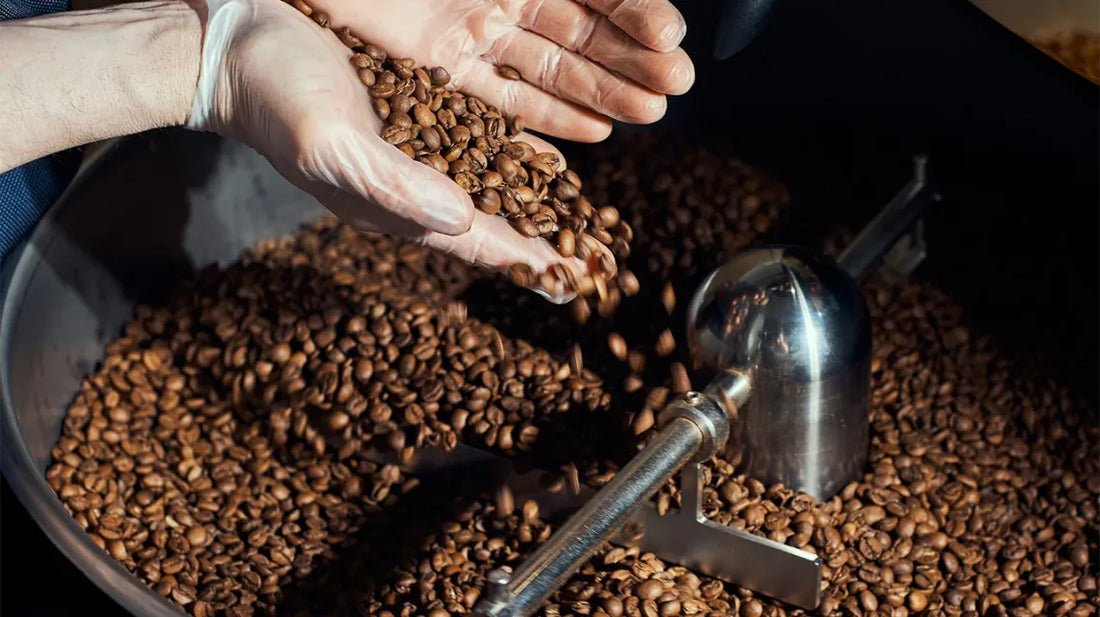
How to Extend Coffee Shelf Life
Share
TLDR;
To extend coffee shelf life, store whole beans in an airtight, opaque container in a cool, dry place, away from light, heat, and moisture. Avoid pre-ground coffee, as it stales faster, and consider vacuum sealing or nitrogen flushing for long-term storage. Freezing is an option but requires proper handling to prevent moisture contamination.
Why Coffee Freshness Matters

Freshness is everything when it comes to coffee. Coffee begins losing its flavor immediately after roasting, and improper storage can speed up the degradation process. Within two weeks of exposure to air, coffee can lose up to 50% of its aromatic compounds.
At Milk & Honey, we understand that the secret to a great cup of coffee isn’t just in the beans—it’s in how you store them. This guide will break down every aspect of coffee preservation so you can keep your beans fresher for longer.
Why Does Coffee Go Stale? Understanding Coffee Degradation

Coffee doesn’t exactly “spoil” like dairy products, but it does lose its flavor and aroma over time due to several factors:
Oxidation: The Biggest Culprit
Oxygen exposure is the primary reason coffee goes stale. The moment coffee beans are roasted, they start releasing carbon dioxide and absorbing oxygen. This process depletes the essential oils and compounds that give coffee its rich aroma and taste.
Moisture Absorption: Why Humidity is Your Enemy
Coffee is hygroscopic, meaning it absorbs moisture from the air. When beans absorb excess moisture, they lose their complex flavors and take on a dull, cardboard-like taste.
Light & Heat Sensitivity: How Temperature Ruins Coffee
Exposure to light and heat speeds up coffee degradation. Direct sunlight and fluctuating temperatures cause coffee’s natural oils to break down, leading to a stale and bitter taste.
Grinding Too Soon: Why Pre-Ground Coffee Stales Faster
Whole beans retain their freshness much longer than pre-ground coffee. The moment coffee is ground, it has a larger surface area exposed to oxygen, which speeds up the oxidation process. Grinding only what you need before brewing will drastically improve freshness. This is especially true for lighter roasts, where preserving delicate aromatics is key—learn more in our guide on Blonde Roast Coffee Explained.
Best Practices for Storing Coffee Beans

Use Airtight Containers
If you’re serious about flavor, it all starts with storing coffee the right way. The best method is to use an airtight container. The ideal container should:
- Be made of stainless steel or ceramic (to prevent light exposure)
- Have a vacuum-sealed lid or one-way valve to prevent air infiltration
Avoid Transparent Jars
Glass jars may look stylish, but they expose coffee to light, which accelerates degradation. Instead, opt for opaque, airtight containers.
Store Coffee in a Cool, Dark Place
The best place to store coffee is in a pantry or cabinet away from direct sunlight, heat, and humidity. Avoid storing it near the stove, oven, or refrigerator.
Should You Store Coffee in the Fridge?

No, storing coffee in the refrigerator is not recommended. Fridges contain moisture and odors that coffee easily absorbs, leading to stale and off-flavored beans. Instead, store your coffee at room temperature in a sealed container.
Advanced Storage Techniques for Maximum Freshness

Vacuum Sealing Coffee Beans
Vacuum-sealing coffee removes excess air, slowing down oxidation. A vacuum sealer is an excellent investment if you buy coffee in bulk.
How to Vacuum Seal Coffee Properly:
- Use vacuum-sealable coffee bags or storage containers.
- Remove as much air as possible before sealing.
- Store in a cool, dark place.
Nitrogen Flushing: What It Is & Why It Works
Coffee Packaging & Freshness go hand in hand, especially when it comes to nitrogen flushing. This method, used by commercial roasters, displaces oxygen inside coffee packaging, preserving freshness for months. While difficult to do at home, purchasing nitrogen-flushed coffee ensures a longer shelf life.
Freezing Coffee: Good or Bad?

Freezing coffee can work—but only if done correctly. If you're trying to stretch your supply or find a cheaper coffee option by buying in bulk, freezing can help preserve freshness—as long as it’s done right. If you freeze coffee improperly, it can absorb moisture and odors from your freezer, leading to stale flavors.
When Freezing Works:
- Store coffee in small, airtight, moisture-proof bags or containers.
- Freeze in single-use portions to avoid repeated thawing and refreezing.
- Avoid opening frozen coffee until it has fully reached room temperature to prevent condensation.
What NOT to Do:
- Don’t freeze coffee in its original packaging.
- Don’t refreeze coffee once it has been thawed.
- Avoid freezing pre-ground coffee, as its increased surface area makes it more susceptible to moisture absorption.
Common Mistakes That Ruin Coffee’s Shelf Life

- Leaving Coffee Exposed to Air for Too Long – Always reseal coffee bags properly.
- Using the Wrong Storage Containers – Glass jars and plastic containers allow light and oxygen exposure.
- Buying Too Much Coffee at Once – Only buy what you can consume within a few weeks.
- Grinding All Your Beans at Once – Grind coffee as needed to maximize freshness.
Proper storage not only extends freshness but also helps Reduce Coffee Bitterness by preserving the beans' natural oils and flavors.
Quick Fixes for Fresher-Tasting Coffee:
- Store beans in airtight, opaque containers.
- Keep coffee in a cool, dark place.
-
Buy fresh, whole beans and grind just before brewing.
Coffee Storage Do’s & Don’ts (Infographic)
 A visual guide summarizing the best practices for storing coffee.
A visual guide summarizing the best practices for storing coffee.
Do’s:
- Use airtight, opaque containers.
- Store in a cool, dry place.
- Buy whole beans and grind before brewing.
Don’ts:
- Store in the fridge or freezer without proper precautions.
- Use transparent or non-airtight containers.
-
Buy in bulk without proper storage methods.
Conclusion: The Best Way to Store Coffee for Longevity
The key to extending coffee shelf life is proper storage. Keep whole beans in an airtight, opaque container at room temperature, away from light, heat, and moisture. Avoid pre-ground coffee, refrigerating beans, and improper freezing methods.
At Milk & Honey, we’re dedicated to helping you make the best coffee possible. Try these storage techniques and taste the difference in your next brew.
